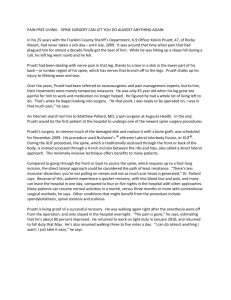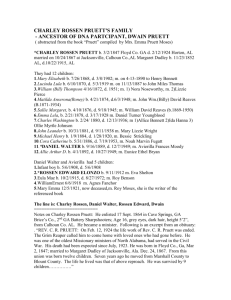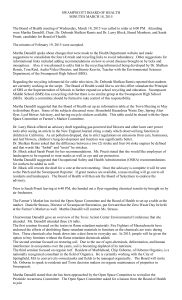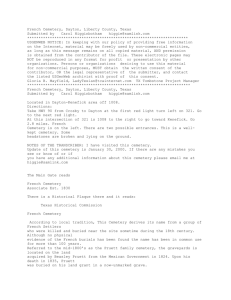Dr - Pruett/Pruitt/Prewitt
advertisement
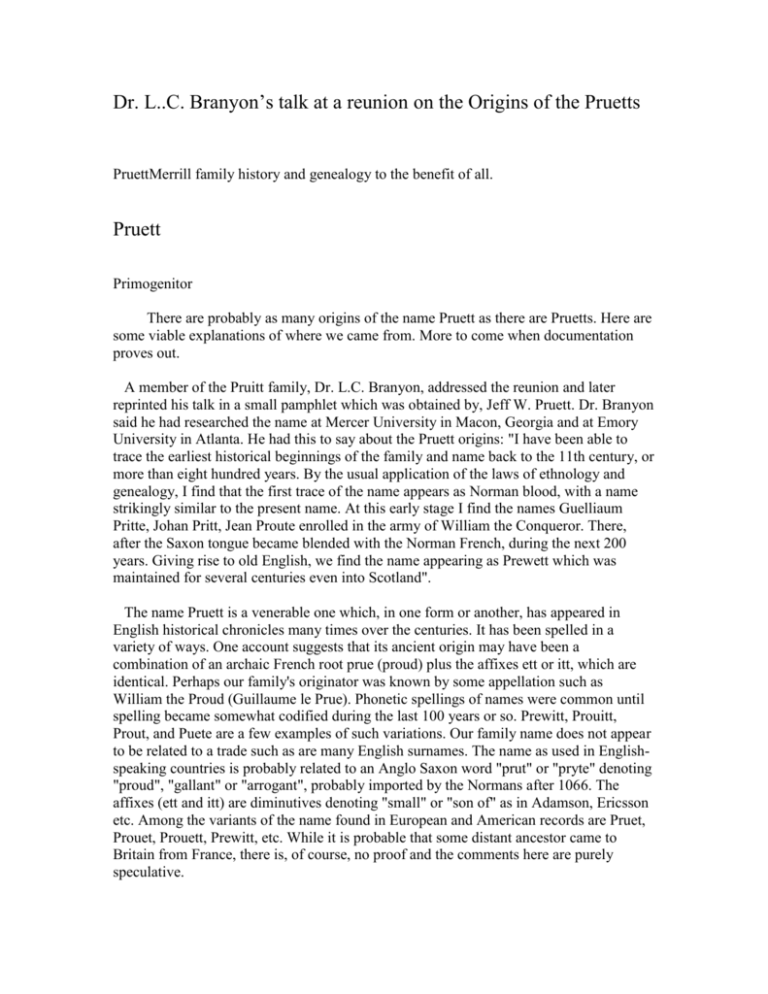
Dr. L..C. Branyon’s talk at a reunion on the Origins of the Pruetts
PruettMerrill family history and genealogy to the benefit of all.
Pruett
Primogenitor
There are probably as many origins of the name Pruett as there are Pruetts. Here are
some viable explanations of where we came from. More to come when documentation
proves out.
A member of the Pruitt family, Dr. L.C. Branyon, addressed the reunion and later
reprinted his talk in a small pamphlet which was obtained by, Jeff W. Pruett. Dr. Branyon
said he had researched the name at Mercer University in Macon, Georgia and at Emory
University in Atlanta. He had this to say about the Pruett origins: "I have been able to
trace the earliest historical beginnings of the family and name back to the 11th century, or
more than eight hundred years. By the usual application of the laws of ethnology and
genealogy, I find that the first trace of the name appears as Norman blood, with a name
strikingly similar to the present name. At this early stage I find the names Guelliaum
Pritte, Johan Pritt, Jean Proute enrolled in the army of William the Conqueror. There,
after the Saxon tongue became blended with the Norman French, during the next 200
years. Giving rise to old English, we find the name appearing as Prewett which was
maintained for several centuries even into Scotland".
The name Pruett is a venerable one which, in one form or another, has appeared in
English historical chronicles many times over the centuries. It has been spelled in a
variety of ways. One account suggests that its ancient origin may have been a
combination of an archaic French root prue (proud) plus the affixes ett or itt, which are
identical. Perhaps our family's originator was known by some appellation such as
William the Proud (Guillaume le Prue). Phonetic spellings of names were common until
spelling became somewhat codified during the last 100 years or so. Prewitt, Prouitt,
Prout, and Puete are a few examples of such variations. Our family name does not appear
to be related to a trade such as are many English surnames. The name as used in Englishspeaking countries is probably related to an Anglo Saxon word "prut" or "pryte" denoting
"proud", "gallant" or "arrogant", probably imported by the Normans after 1066. The
affixes (ett and itt) are diminutives denoting "small" or "son of" as in Adamson, Ericsson
etc. Among the variants of the name found in European and American records are Pruet,
Prouet, Prouett, Prewitt, etc. While it is probable that some distant ancestor came to
Britain from France, there is, of course, no proof and the comments here are purely
speculative.
While spelled many different ways, the name is invariably pronounced the same in both
England and America - "prew-itt". Richard Prewitt, of Des Moines, Iowa, in his
chronicles of the family touches on various legends associated with the family. One of
this writer's favorites is that there was a General George Byrd Pruet, said to have been a
gallant and dashing soldier who fought in the Colonial Wars and the son of Mary Prout
and Roger Prett of Manakin Town in Virginia. Alas, diligent research by family
historians more qualified than this writer has failed to turn up any trace of such a person.
The Hall of Names, Ltd. in Great Britain reports that the name Pruett (or its
recognizable variations) has been found in ancient Welsh chronicles pre-dating 1066.
Therefore, the name's origins may not be French. This source says that the name was first
found in Carmarthenshire in Wales. Versions of the family name appear as early as the
thirteenth century in such records as the Domesday Book, Hearth Rolls, the Black Book
of Exchequer and the Curia Rolls. In 1202, Matthew Pruet was listed in the "Pipe Rolls".
In another document it was recorded that in 1249 William Pruet and his son, Adam, "did
damage to the King's property in Winchester". The Inquest record does not tell us what
punishment befell our ancient cousins for this deed. We also learn from the Charter Rolls
of King Henry VIII that in 1273 the Earl of Darby released Reginald Pruet and his issue
and their lands and holdings from "servetutem" and made them freemen. In 1273,,
Andrew and William Pruet were mentioned in the "Hundred Rolls of Cambridge". In
1275, Henry Pruet was pardoned a twelve shilling fine for contempt. In 1278, Hugh Pruet
of Somerset went surety for £ 40 and in 1317, Thomas Pruwet of Devon was mentioned
in Dwelly's Name Indices. (All of the foregoing references were reported by Richard
Prewitt in his published Prewitt-Pruitt Family chronicles). In those times, it was not
uncommon for a person to be born with a surname spelled one way, marry and change
the spelling, then have another version inscribed on his or her headstone marking a final
place of rest. Other versions of the name from these sources include Prewett, Prewert and
Prewitt. Many of these names are to be found in use today in Wales and in other parts of
the British Isles.
While there has been a good deal of serious and scholarly work done to track down
various branches of the Pruett family, there is one account the author obtained from a
source in England which, while perhaps a bit fanciful, is interesting. A portion of this
material follows:
"The Welsh family name Pruett emerged [from the period following the Norman
Conquest] as a notable family name in Carmarthen where they were recorded as a family
of great antiquity seated as Lords of the manor and estates in that shire. They were
descended from Cadivor Vawn, Lord of Blaen Cuch in Dyved. By the 13th century they
had branched to Dolwyn, Plas Landra, Hawkserook, and Llaugharne and Egremond in
Carmarthenshire. In 1202 the name was found in Somerset when Mathhew Pruett was
Lord of the manor in that shire. In 1278 Thomas, Walter and Julianna Pruett were all land
holders in Somerset. The name was interchangeably Prytherch and Pruett, where the 'y'in
Welch being pronounced 'u'".
Hall of Names, Ltd., London
An early record of the name was the "Hundred Rolls" in the County of Cambridge in
1273 listing Andrew and William Pruet. Records from 1327 in Somersetshire list Thomas
Pruwet, Walter Prowet and Juliana Prouet, most probably the same source as above with
the spelling modernized by the Hall of Records. Mary Pruett, said to have been a nurse of
London, who died in 1717, is buried at St. Dionis Backchurch, London. During the
seventeenth and early eighteenth centuries, migration from England to America was
steady in spite of the hazards involved. A typical pattern of movement of Americans
during the seventeenth and eighteenth centuries was Westward. By the reckoning of that
era, central North Carolina was considered west of Virginia, across the mountains.
Migrations into South Carolina, Georgia and Alabama were even further west as the
frontier of American civilization moved on.
There appear to have been several coats of arms granted in the Middle Ages to people
bearing the Pruett surname. The most ancient one was "silver with a black lion rampant"
sometimes with a raven crest and bearing the motto Deus Pascit Corvos. Another coat is
described as "azure - a chevron between lions rampant or (gold or yellow)". Another
motto associated with the name is "Loyal and Trustworthy" found cut into tombstones
bearing the family crest in Gloustershire. Tracing direct descent from families granted
these specific arms would be difficult.
Even the amateur researcher in genealogy such as this writer recognizes early in his
studies that sometimes records can be grossly misleading. Tracking down ancestors by
surname sometimes reveals that an ambitious ancestor simply changed his name
somewhere along the line for any number of reasons -political expediency, to escape the
law, change over a generation or two due to illiteracy and so on. Those of us who would
fancy that we had a duke or lord of the manor might be well advised to ponder on the
reality that the noble Lord Ancestor most probably was a poor but (one hopes) honest
farmer but might even have been an inept pickpocket who jumped on a ship in
Southampton to avoid an overly tight necktie. Not that we have found any such
miscreants in our line . . . yet. - Bill Pruett
'Abraham Pruett & Rebecca Branson, Their Descendants' (1995) by Richard A. Prewitt,
1800 NW 81st Street, Des Moines, IA 80325 says: "The name, PRUETT, is spelled
variously: Pruitt, Prewet, Prewitt, etc., all thought to be derived from the Anglo-Saxon
word 'pryte,' the meaning of which was 'that of which is justly proud, self-respect, etc.'
Bardsley’s book gives the etymology of Pruitt as coming from Anglo-Saxon 'prut,'
meaning haughty or arrogant."
Pruett origin in Wales: Pruett name meaning 'Proud Little Man' NOT a cut-down but
meaning one willing to stand their ground. Pudens, Prudens, Prud, Prue, Pruett part of
old, old, old Welsh roots dating as far back as 60AD, see the Bible, 2 Timothy 4.21,
Pudens mentioned there is one of those the Apostle Paul sends greetings to, Bible
scholars say Pudens is a early Christian of Welsh origin, of course the Roman Empire
spread that far and nationals were brought as slaves to the Mediterranean [Rome]...
Carmarthenshire Wales does have pretty strong evidence as origin place for Pruett. To
this day alot of Pruetts dwell in west UK. Another interesting angle on this is that the
Celtic peoples [Picts, Welsh, Scot, Irish] WERE spread out over Europe due to trade etc.
in the 1st & 2nd centuries.
Pruetts are Scottish: the name "pru" means watchful of money interests and "it" means
proud. The Pruetts came to American from the Cheviott Hills of Scotland. The original
name was coined in the fifth century in Iceland and then the Pruetts migrated to Ireland
and thence to Scotland. Sir Water Scott's mother was Pruitt and he was the 9th of 12
children. Josiah and Eliza(Smith) Pruett came to a new land grant from King Charles of
England in 1697 which was composed of the area of Virginia, North and South Carolina,
Florida and Franklin(now named Tennessee).
"The "Standard Story" is that it's anglicized French, having relocated from France to
England at a fairly early time. According to ~The Story~, it should have been spelled
something like "Pruette" or "Prouette", and yeah, it is supposed to have meant something
like "Little Proud One" or "A Little Bit Proud".
Doesn't sound very flattering to me, and besides, I'm starting to grow skeptical about it.
Every explanation I've seen seems to assume that because "-ette" is a French diminutive
ending, "Pr{ew,(o)u}{e,i}t(t(e))" (How's that for an all-inclusive schema?) must be the
diminutive of something French that is a lot like "Pru". The word that people usually
come up with is "prud" -- which I just checked out. The word doesn't seem to be in
French anymore, but in Old French it was "prud", "prod", or "prou" and meant not
'proud', but 'capable', 'good', or 'valiant'. Well, a little bit good or a little bit competent or
brave is a little bit better than a little bit proud, I guess. (Actually, the "little" could be
used affectionately as well, instead of just to indicate smallness. "Dear Brave One"...? I
dunno.)
Anyway, I suspect that people got stuck on this explanation as soon as they found one
that seemed to make sense. There are other possibilities. Here's a random one (i.e. not
necessarily the best): Since the earliest spelling I'm seeing so far is something like
"Prewet(t)" or "Prewit(t)", it might be worthwhile to ignore, for a moment, solutions that
depend on an original "Pru-" or "Prou-" spelling, and to consider the implications of that
W...
W has only been around for five hundred years or so. Before it was invented, U and V
were used to represent the sound of W. For that matter, U and V have been distinct letters
for even less time, say only about 300 years. (Sometimes UU or VV was used to indicate
W, but sometimes just U or V was.) Given all this, and ignoring the pronunciation for a
moment, the name might easily have been written "Preuet" or "Prevet" sometimes.
Now usually, if you knew the person, you'd know whether to pronounce the V or U in
their name like a V, or more like a U or W. But if you _didn't_ know them, you might
start calling them by the wrong pronunciation. So, if your name was basically "Prewet",
with a W-sound, people who didn't know you (say, because you had moved) might
mistakenly pronounce it like "Prevet". They would have no way of knowing, just from
the spelling; and maybe you'd get tired of correcting everybody. (I know people today
who give up, and do this sort of thing.)
In that case (Remember, I'm being totally hypothetical here...), maybe we should be
talking to the people named Privett who are also on this forum. Their name, in spite of its
"-ette"-like ending, does not appear to be a French import, but instead goes back all the
way to the 8th century, when the Anglo-Saxon Chronicle records that a king named
Sebright (Sigebriht) was killed at a place called "Pryfetes Flode" ('Pryfet's Flood' -apparently a place where the water had a tendency to rise unpredictably).
(In Old English, which was a much earlier situation than that of the U/V story above,
the letter F was the only letter that was ever pronounced like a V, and then only in certain
positions. U and V, at this very early time, were *only* pronounced like a U. Details,
details... Sorry, but each era has a pile of 'em.)
The modern name of this place is Privet(t), in Hampshire, near the south coast of
England. This is not very far at all from Wiltshire, where my own paternals are supposed
to have originated. (I *think* I've figured out that I'm descended from a Thomas Prewitt,
who was born in 1616 near Salisbury, and who emigrated to Virginia in 1636.)
In this imaginative scenario, we end up with a name that existed in some of the earliest
recorded Anglo-Saxon documents, and would seem to have little chance of being French
in origin (since Norman-French didn't begin to show serious influence on English until
the Norman Invasion in the 11th century)." - Brian Pruett
http://www.merrill.org/pruett/primogenitor.html

